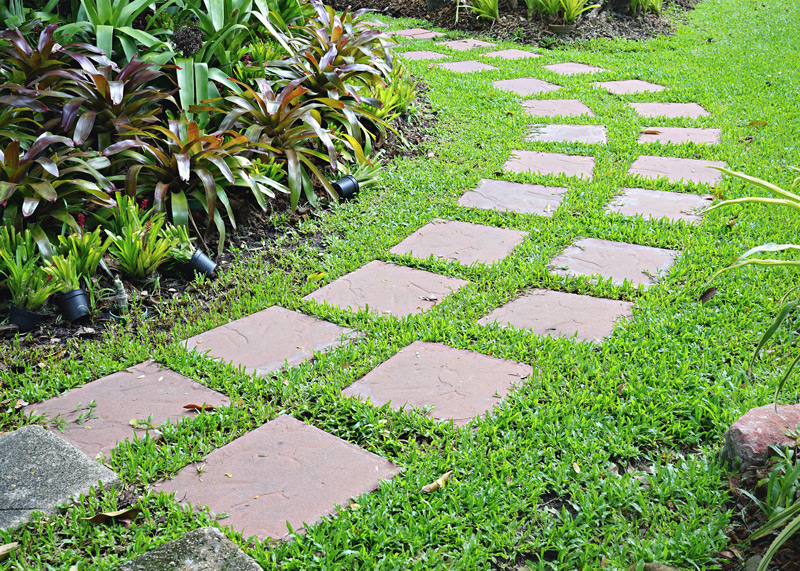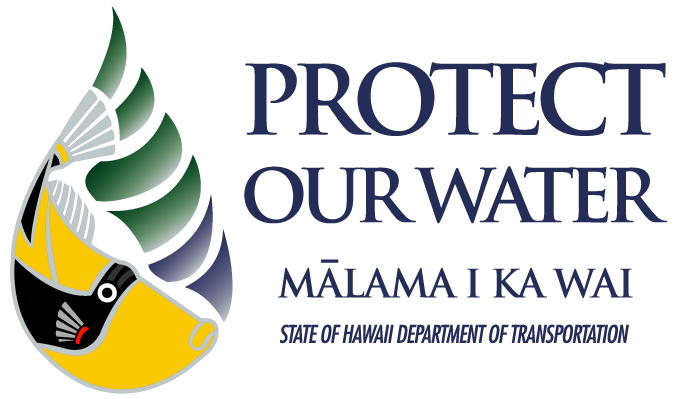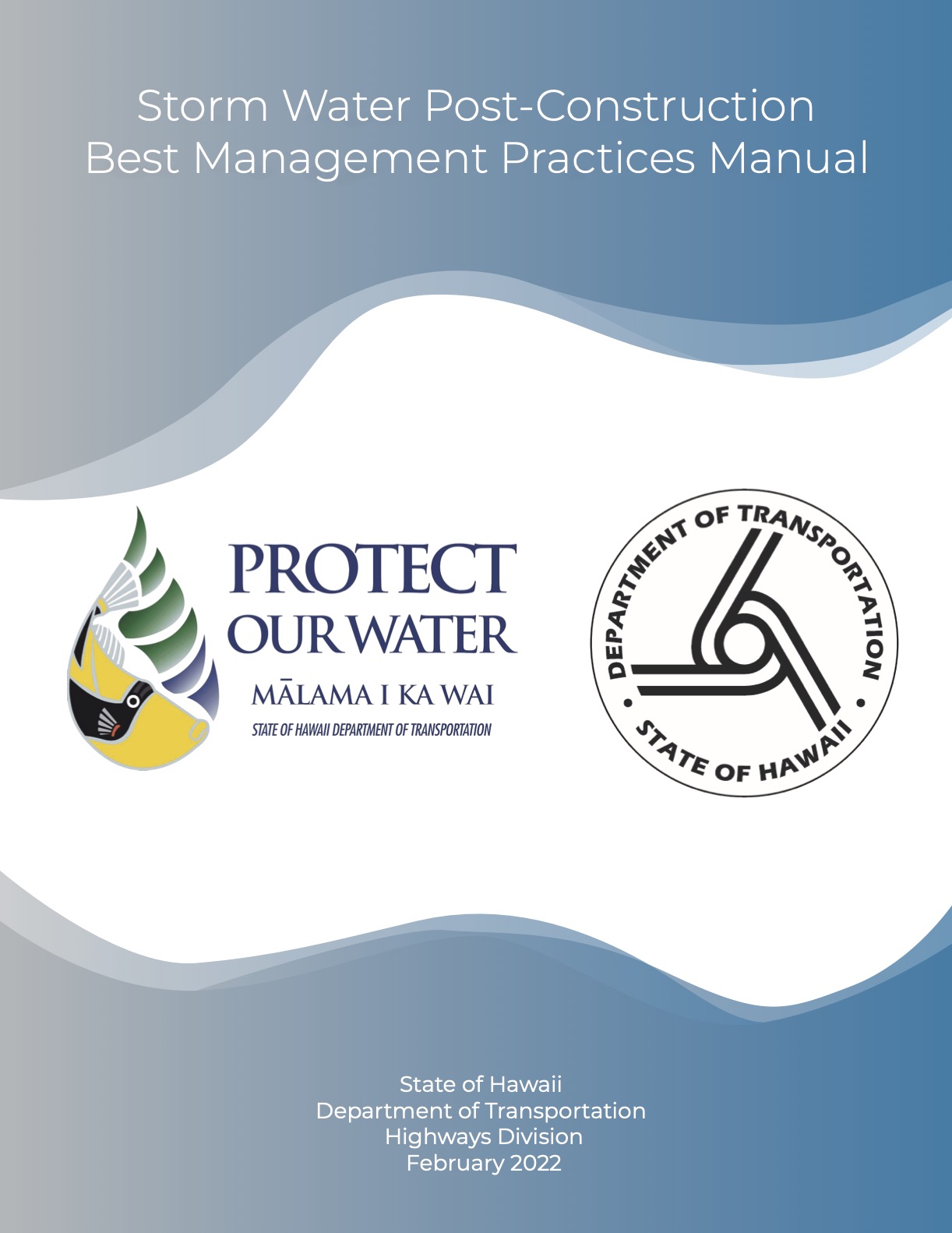Storm water is everybody’s business!
Construction is a major industry in our islands. However, while great for the economy, construction can have potentially disastrous effects on the environment. Construction activities can increase the rate of erosion by as much as 1,000 times the natural rate.1 Sediment pollution, the most common pollutant from construction activities, has been proven to cause monetary damages of up to $16 billion per year.2
Fortunately, HDOT Highways has a comprehensive construction site runoff control program to reduce the discharge of pollutants from construction activities on State highways to the maximum extent practicable. Visit the tabs below for helpful information for design consultants and construction contractors working on HDOT Highways projects or within HDOT Highways rights-of-way.
1Storm Water Management For Construction Activities: United States of America Environmental Protection Agency. 1992. Developing Pollution Prevention Plans and Best Management Practices, 1992.
2 United States of America Environmental Protection Agency. 2012. Winter Watershed Tip series brochure “What is Sediment Pollution?”
What to Know About HDOT's Construction Projects?
HDOT’s construction site management program is implemented to reduce the discharge of pollutants from both private and public construction projects (i.e., contract, maintenance, and encroachment) to the maximum extent possible. Designers and contractors play a critical role in mitigating pollutants generated from active construction sites.
Temporary construction Best Management Practices (BMPs) and permanent post-construction BMPs should be considered on every project to minimize the environmental impact and preserve our natural resources. If you currently work for HDOT, or are thinking of doing work in HDOT rights-of-way, here are FAQs to consider before starting work on construction projects.

Do I need any permits for my project?
If you answer “YES” to any of the following questions, you will need a permit in order to start work. To request HDOT permits, please contact HDOT via email at DOT.HWYO.Permits@hawaii.gov.
Am I working within HDOT rights-of-way?
PERMIT NEEDED: State of Hawaii Department of Transportation
Permit to Perform Work Upon State Highways
Will my project discharge into an HDOT storm drain?
PERMIT NEEDED: State of Hawaii Department of Transportation
Application and Permit To Discharge to the State of Hawaii Highways Drainage System
Will my project connect to an HDOT storm drain?
PERMIT NEEDED: State of Hawaii Department of Transportation
Application and Permit For Connection To The State of Hawaii Highways Drainage System
Does my project disturb an acre or more of land?
PERMIT NEEDED: National Pollutant Discharge Elimination System General Permit Coverage or Individual Permit Coverage
For more information about General Permit or Individual Permit coverage, please visit the State of Hawaii Department of Health website.
Do I need a Site-Specific Construction BMP Plan?
Before starting construction activities (for HWY-O projects or within HWY-O rights-of-way), ensure you have the required permits and BMP plan approved by HDOT. Refer to the table below for the type of BMP plan required for your construction project.
| Type of Project | BMP Plan | Submit To Reviewers | Checklist Used by HWY-O |
|---|---|---|---|
| Public Construction Project (with an NGPC/Individual permit) | Storm Water Pollution Prevention Plan (SWPPP) | HDOT Project Engineer | SWPPP Review Checklist |
| Public Construction Project (without an NGPC/Individual permit) | Site-Specific BMP (SSBMP) Plan | HDOT Project Engineer | SSBMP Plan Review Checklist |
| Private Construction Project encroaching HWY-O rights-of-way | Written BMP Plan | HDOT Permitting Engineer (DOT.HWYO.Permits@hawaii.gov) | SSBMP Plan/SWPPP Review Checklist |
*Public Construction Project – A construction activity, which is funded by DOT-HWYS, designed either by personnel of DOT-HWYS or engineering consultant firms, and constructed by DOT-HWYS or a private contractor. Includes construction projects and maintenance construction projects.
*Private Construction Projects – Construction activity not under the authority (funding) of or administered by DOT-HWYS that is located within or adjacent to DOT-HWYS ROW and drains to the DOT-HWYS ROW. Private construction projects are required to obtain a ‘Permit to Perform Work Upon State Highways’ prior to commencing construction activities.
For more information, please visit the HDOT Guide to Permits. For permits and files to assist in the review and implementation of BMPs, please see below.
- Developing Your Stormwater Pollution Prevention Plan
- SSBMP Plan/SWPPP Amendment Review Form
- Construction Best Management Practices Field Manual (Oct 2021)
- Permit to Perform Work Upon State Highways
- Permit for the Occupancy and Use of State Highways Right-of-Way
- Enforcement Response Plan
- Permit Holder’s Guide Rack Card
2022 Post-Construction BMP Workshop
To learn more about our Permanent BMP criteria, download the presentation from our 2022 Post-Construction BMP Workshop.
2022 Post-Construction (Permanent) Best Management Practices Materials (for projects initiated on or after July 1, 2022)
- 2022 Storm Water Post-Construction (Permanent) Best Management Practices Manual
- 2022 Post Construction (Permanent) BMP Review Checklist for MS4 Areas
- 2022 Post Construction (Permanent) BMP Review Checklist for Non-MS4 Areas
- 2022 Post-Construction (Permanent) BMP Alternative Compliance Guide and Worksheet
2015 Permanent Best Management Practices Materials (for projects initiated prior to July 1, 2022)
2024 Protect Our Water Conference
Mahalo to everyone who attended the 2024 Protect Our Water Conference. Below you’ll find the presentation materials available for download:
- Keynote – HDOA Protecting Our Water (Presenter: Sharon Hurd – Board of Agriculture)
- Updates to the Post-Construction BMP Manual (Presenters: Jason Lau, P.E. – The Limtiaco Consulting Group & Richard Price, P.E. – EA Engineering, Science, and Technology, Inc.)
- Updates to the DOTA Construction Site Runoff and PBMP Program (Presenter: Mikki Slentz, P.E. – Haley & Aldrich, Inc.)
- Lahaina Wildfire Storm Water Mitigation Response (Presenter: Mark Ohigashi, P.E. – EnviroServices & Training Center, LLC)
- Refresher of Harbors Construction and Post-Construction Programs (Presenter: Ying “Joy” Zhang, P.E. – Hawaii Department of Transportation)
- USACE Permitting: Process and Tips (Presenter: Josh Moffi – U.S. Army Corps of Engineers)
- The Replacement of Makaha Bridges 3 and 3A (Presenters: Ben Garde, P.E. & Chord Medeiros – QRSE, LLC)
- Autodesk Construction Cloud Best Management Practices (Presenter: Joel Thomas, CCM – QRSE, LLC)
Presentations from the 2024 Protect Our Water Conference will be uploaded to our YouTube page at a later date. Presentations from all previous Protect Our Water Conferences can be found on our YouTube page.
2019 Protect Our Water Conference
Mahalo to everyone who attended the 2019 Protect Our Water Conference. Below you’ll find the presentation materials available for download:
- Keynote (Presenter: John McCullah, CPESC, Geomorphologist)
- Guarding the Future – Protecting Post Construction BMPs During Construction (Presenter: Jon Lowry, P.E. – EnviroServices & Training Center, LLC))
- Dirt Cheap: The Cost of Erosion (Why Be Compliant?) (Presenter: Eddie Snell – Applied Polymer Systems, Inc.)
- Lessons Learned: Internal Audit of DOT’s Construction Program (Presenter: Vijaya Tummala, P.E. – EnviroServices & Training Center, LLC)
- HIGHWAYS – Have You Ever Seen the Rain: Intro/Overview of Storm Water Requirements for Construction (Presenter: Larissa Sato, P.E. – WSP)
- It’s Not Brain Surgery, It’s Harder: The Best of the BMPs (Presenter: John McCullah – Salix Applied Earthcare)
- Back on the Road: Emergency Highway Restoration After A Hurricane (Presenter: Eddie Snell – Applied Polymer Systems, Inc.)
- Construction Activities & Contaminated Media (Presenter: Lauren Cruz & Iris van der Zander, PhD – DOH HEER)
- Rain or Shine; It’s Inspection Time: Independent Inspections (Presenter: Claudia Akroyd – Bowers + Kubota)
- Mission Impossible: Advanced Methods for Extreme Slopes (Presenter: John McCullah – Salix Applied Earthcare)
- Your BMP Inspector: BFF or Mortal Enemy (Presenter: Eddie Snell – Applied Polymer Systems, Inc.)
- HARBORS: Construction & Post Construction Program Requirements (Presenter: Jon Lowry, P.E. & Marleina Lyons-Wolfe – EnviroServices & Training Center, LLC)
- Nowhere to Run: Tips on Runoff and Sediment Control BMPs (Presenter: John McCullah – Salix Applied Earthcare)
- You Get What You Pay For: Inlets, Entrances, Perimeter Controls (Presenter: Eddie Snell – Applied Polymer Systems, Inc.)
- New Appendix C: General Permit Review & Enforcement Case Studies (Presenter: Bobbie Teixeira – DOH CWB)
Presentations from all previous Protect Our Water Conferences can be found on our YouTube page.


